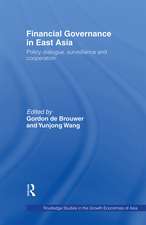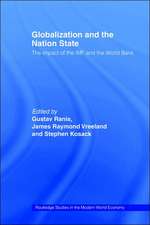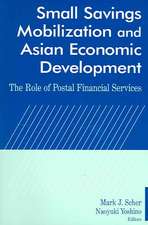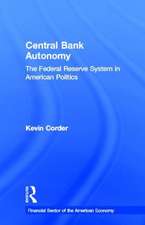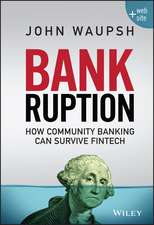Emerging Risk in International Banking (RLE Banking & Finance): Origins of Financial Vulnerability in the 1980s: Routledge Library Editions: Banking & Finance
Autor P Snowdenen Limba Engleză Hardback – 25 mai 2012
Din seria Routledge Library Editions: Banking & Finance
- 18%
 Preț: 1005.04 lei
Preț: 1005.04 lei - 35%
 Preț: 530.66 lei
Preț: 530.66 lei - 36%
 Preț: 13444.74 lei
Preț: 13444.74 lei - 18%
 Preț: 1007.12 lei
Preț: 1007.12 lei - 36%
 Preț: 854.69 lei
Preț: 854.69 lei - 18%
 Preț: 1116.31 lei
Preț: 1116.31 lei - 18%
 Preț: 1006.43 lei
Preț: 1006.43 lei - 18%
 Preț: 784.07 lei
Preț: 784.07 lei - 38%
 Preț: 766.85 lei
Preț: 766.85 lei - 39%
 Preț: 681.92 lei
Preț: 681.92 lei - 38%
 Preț: 766.12 lei
Preț: 766.12 lei - 38%
 Preț: 766.85 lei
Preț: 766.85 lei - 38%
 Preț: 762.53 lei
Preț: 762.53 lei - 24%
 Preț: 327.96 lei
Preț: 327.96 lei - 24%
 Preț: 348.31 lei
Preț: 348.31 lei - 18%
 Preț: 1002.95 lei
Preț: 1002.95 lei - 37%
 Preț: 624.79 lei
Preț: 624.79 lei - 34%
 Preț: 626.22 lei
Preț: 626.22 lei - 21%
 Preț: 332.17 lei
Preț: 332.17 lei - 37%
 Preț: 597.33 lei
Preț: 597.33 lei - 18%
 Preț: 1004.34 lei
Preț: 1004.34 lei - 37%
 Preț: 625.16 lei
Preț: 625.16 lei -
 Preț: 419.16 lei
Preț: 419.16 lei - 25%
 Preț: 313.40 lei
Preț: 313.40 lei - 18%
 Preț: 1003.99 lei
Preț: 1003.99 lei - 35%
 Preț: 997.28 lei
Preț: 997.28 lei - 37%
 Preț: 625.16 lei
Preț: 625.16 lei - 18%
 Preț: 1065.06 lei
Preț: 1065.06 lei - 35%
 Preț: 995.66 lei
Preț: 995.66 lei - 18%
 Preț: 1009.21 lei
Preț: 1009.21 lei -
 Preț: 127.54 lei
Preț: 127.54 lei - 38%
 Preț: 767.93 lei
Preț: 767.93 lei - 34%
 Preț: 625.68 lei
Preț: 625.68 lei - 36%
 Preț: 825.06 lei
Preț: 825.06 lei - 18%
 Preț: 1002.80 lei
Preț: 1002.80 lei -
 Preț: 413.37 lei
Preț: 413.37 lei - 18%
 Preț: 1062.16 lei
Preț: 1062.16 lei -
 Preț: 113.69 lei
Preț: 113.69 lei
Preț: 891.61 lei
Preț vechi: 1087.33 lei
-18% Nou
Puncte Express: 1337
Preț estimativ în valută:
170.63€ • 185.28$ • 143.33£
170.63€ • 185.28$ • 143.33£
Carte tipărită la comandă
Livrare economică 22 aprilie-06 mai
Preluare comenzi: 021 569.72.76
Specificații
ISBN-13: 9780415529426
ISBN-10: 0415529425
Pagini: 156
Dimensiuni: 156 x 234 x 11 mm
Greutate: 0.46 kg
Ediția:Revised
Editura: Taylor & Francis
Colecția Routledge
Seria Routledge Library Editions: Banking & Finance
Locul publicării:Oxford, United Kingdom
ISBN-10: 0415529425
Pagini: 156
Dimensiuni: 156 x 234 x 11 mm
Greutate: 0.46 kg
Ediția:Revised
Editura: Taylor & Francis
Colecția Routledge
Seria Routledge Library Editions: Banking & Finance
Locul publicării:Oxford, United Kingdom
Public țintă
General, Postgraduate, Professional, and UndergraduateCuprins
Acknowledgements. Introduction. 1. Changing Current Account Patterns in the 1970s 2. Global Investment ‘shifts’ and financing patterns 3. Outward-looking policies in an inward-looking world: the cases of Brazil and Chile 4. Financial intermediation, maturity transformation and inter-bank activity 5. Credit markets, loss risk and the forces of expansion 6. Bank balance sheet adjustment in a competitive environment 7. Conclusion: Some possible policy options. Index.
Notă biografică
Multivolume collection by leading authors in the field
Descriere
Global payments imbalances and the rise of emerging economies provide the background to this analysis of risk exposure and near-insolvency at the world’s major banks. Emerging Risk was published in 1985, three years after the first international banking crisis of the post-War era, but prior to resolution after 1989 of the underlying sovereign debt overhang. With episodes of international financial instability punctuating the following quarter century until the Lehman collapse of 2008, this re-issue will contribute to the historical perspective on modern diagnoses of policy weakness and financial sector excess that is clearly needed. Whereas OPEC price increases in the 1970s were a source of the earlier global imbalances, Chinese surpluses and those occasioned by her rapid growth among commodity and oil producing countries are today’s equivalents. As a reading of Emerging Risk will confirm, both the special consequences of free competition in a global banking market, and the perverse incentives inherent in the remuneration of loan officers, were clearly present in the mid-1980s. The interaction of regulation and the competitive response of banks to produce increased reliance on wholesale borrowing and lending, together with enhanced gearing, have clear echoes in modern debates over the consequences of the Basel provisions.



